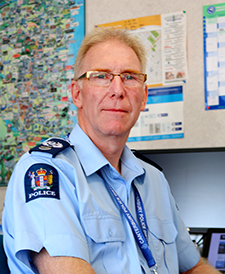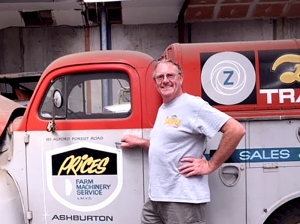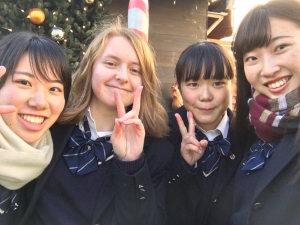Search

 Senior Sergeant Mark Worner. Photo supplied.He might be new to the helm of Ashburton Police, but when it comes to getting to know the community, Mark Worner has already done plenty of groundwork.
Senior Sergeant Mark Worner. Photo supplied.He might be new to the helm of Ashburton Police, but when it comes to getting to know the community, Mark Worner has already done plenty of groundwork.
Worner is two weeks into an eight-week spell as Ashburton’s Detective Senior Sergeant while a permanent replacement is selected.
Having grown up here for nineteen years, he already has a pretty thorough grasp of local faces and names.
“I get on well with people,” he said.
“I think that’s one of the things I’m bringing to this role.
“I moved to Ashburton when I was one year old, I went to school locally, at Ashburton College, and I was here right up until I became a policeman, so I already know a lot of people.”
Worner also comes equipped with impressive prior police experience.
He has spent 33 years in the police force in total – from his first five-year posting in Timaru to a role in the Christchurch CIB, then in the Christchurch crime squad, where he managed 52 police staff.
Before Worner, Ashburton’s top cop position was held by Scott Banfield for nearly four years.
Banfield has shifted into a new role within the command centre of Christchurch’s new justice precinct, and the Police are currently accepting and reviewing expressions of interest in Ashburton’s Senior Sergeant Position.
Should a suitable candidate be found, Worner said they will be selected at the end of his six week placement.
By Katie Todd © The Ashburton Guardian - 24 February 2018
 Tony Price was pleased to discover the old work truck had been saved by a Christchurch collector. Photo supplied.Tony Price, former wild child, was made for the Nascar racing scene.
Tony Price was pleased to discover the old work truck had been saved by a Christchurch collector. Photo supplied.Tony Price, former wild child, was made for the Nascar racing scene.
The former Ashburton man once had long hair and ran with bikers; given the chance, he would probably have driven the fast cars in America that ferried illegal moonshine in the 1930s.
Those cars, souped up to avoid the federal tax agents who tried to bust them, are part of Nascar’s folklore history.
By the 1940s, the moonshine runners’ informal races had become an organised sport with rules and a growing following.
Price, who grew up repairing farm tractors in his father’s machinery workshop on Alford Forest Road, has worked his way up from mechanic to pit boss and beyond for the American Roush Fenway Racing, which has just begun its 31st season of Nascar competition.
Roush Fenway is the most successful team in Nascar history and Price has been a big part of that.
He was back in Mid Canterbury recently on family business and happy to talk about his life in the fast lane.
Price went to Ashburton College in the 1970s but says he was a wild child and the classroom was not a natural habitat.
He left at 16 for an mechanic’s apprenticeship with Burnett Motors.
The work was easy for him after spending his younger years working alongside father Keith in his farm machinery business in Ashburton.
While he was being groomed to one day take over the business, the big, slow farm vehicles held no interest for him.
He yearned for speed and his mates had fast cars and motorbikes.
Advanced as a mechanic, he then worked for Smallbones, where he finished his apprenticeship.
He remembers learning a few tricks in the workshop from Ross Proctor and Ross Higgins, who now owns a Harley-Davidson franchise in Thailand.
In 1976, Price decided to chance his arm in Australia building racing car engines and discovered he had a knack for it.
There, he got to know a few American racers and worked on their saloon and sprint cars. Come over to the States, they said. Eventually he did.
He started building race cars and engines with them, winning races all over California and Oregon.
With his reputation growing, he was eventually approached by one of the Nascar racing teams and in 1985 packed up his truck and headed to Charlotte, North Carolina.
Price hit the Nascar headlines as part of a hastily-picked crew that pitted the winner of the Daytona International 400 that year.
Pit crews are like athletes, repeatedly practising jacking up cars, changing tyres and fuelling the machine, to shave seconds off their times – a winning crew put together at the last minute was unheard of.
Price was crewing for Greg Sacks, who was driving an experimental Chevrolet the talented young Kiwi mechanic had been working on quietly, living, working and sleeping in the workshop to get the job done.
“I prepared the car, it won at Daytona with Greg at the wheel.
“That was unheard of.”
It was also the start of a 33-year relationship in the incredibly competitive business of Nascar racing.
Jack Roush, a former Ford engineer and college physics teacher, lured him over to work on his road racing cars, but he really wanted to start a Nascar team.
Price was his man.
Price’s basic training as a mechanic meant he could deal with all aspects of the car.
Later he would concentrate on building the race cars, while another expert took care of the engines.
He did the rounds of race teams for a couple of years and in the 1990s he teamed up with Roush again.
He was in charge of six racing teams under the Roush racing umbrella. Each team had 13 cars and a crew of specialists.
Race cars are an expensive business: Each of the six teams ran 13 cars, new cars were required every race and there were 36 races a year.
Price said cars cost around $100,000 without an engine, which was $90,000.
The 940hp engines are specially made for the car racing industry and made by Roush’s company; they run on a special mix of unleaded petrol and are built for racing at more than 200 miles per hour (around 320km/h).
Compare this power to the 110hp Toyota Corolla in your driveway.
Price said it became his job to rationalise the operation, to look for ways to save money.
Teams would go on to share specialists and reduce crew numbers.
Price said other things had changed on the Nascar scene in the past 30 years too.
Teams now fly to races, instead of trucking 12 hours each way.
The grandstands are also not as full, but there’s better TV coverage.
Price was in New Zealand as the first qualifying races for Daytona got under way and the season will continue to November.
When he’s not at the track, Price enjoys older cars, especially the 1936 Ford he bought at 17 and restored.
He had it shipped to the States, where he lives with his wife Cindy of 32 years; the couple have two daughters, Laura, a dental assistant, and Kilee, an artist.
On this last trip home, he had the pleasure of taking his father to see one of their old work vehicles, which has been bought and stored by a Christchurch enthusiast.
It was part of celebrations to mark Keith’s 90th birthday.
By Linda Clarke © The Ashburton Guardian - 24 February 2018
 Annemieke Burgerhout with her schoolmates in Japan. Photo suppliedAnnemieke Burgerhout has returned to Ashburton College after a nine-month study stint in Japan and is eager to continue her Far East study journey.
Annemieke Burgerhout with her schoolmates in Japan. Photo suppliedAnnemieke Burgerhout has returned to Ashburton College after a nine-month study stint in Japan and is eager to continue her Far East study journey.
The Year 13 student won one of just two national scholarships last year and immersed herself in the Japanese language and culture while studying at Osaka Kun-ei Girls' School.
She was a home-stay student with three different families and describes her trip as ``a once in a lifetime experience''.
``I arrived in April and in time for the Spring blossom, which was just amazing.
``The whole experience was unforgettable for me, both culturally and also in terms of immersing myself in the language.''
Annemieke said one highlight had been a big school cultural festival in September, where she had been involved with presenting a dance spectacle called The Gods.
``It was a lot of work, including some weekends, but it was great to be involved with and we even managed to win our competition.''
While in Japan, Annemieke completed her Level 4 Japanese Language Proficiency Test and will tackle the higher N3 level this year.
Her Japan school experience included attending classes on most Saturdays for half a day, a daily commute that included a bike ride, train and walk and also regular classroom clean ups.
``In Japan it is the students who are tasked with keeping the classrooms clean, which was fine by me.''
Her sightseeing trips included visits to the cities of Kyoto, Kobe and Hiroshima and also some island hopping.
``I made some good friends and we keep in touch through Messenger. I message some of them in English and others in Japanese, which is cool.''
Annemieke said her grasp of oral and written Japanese had increased and she was more confident with the language in general.
While she missed out on taking her NCEA Level 2 examinations because of being overseas, she will complete Level 3 this year in English, Japanese, History, Geography and Maths.
``My trip has made me eager to study something with Japanese at university.
``I'll be trying for a possible Japanese scholarship this year and I quite like the idea of being a Japanese teacher or a translator one day.''
By Mick Jensen © The Ashburton Courier - 22 February 2018


